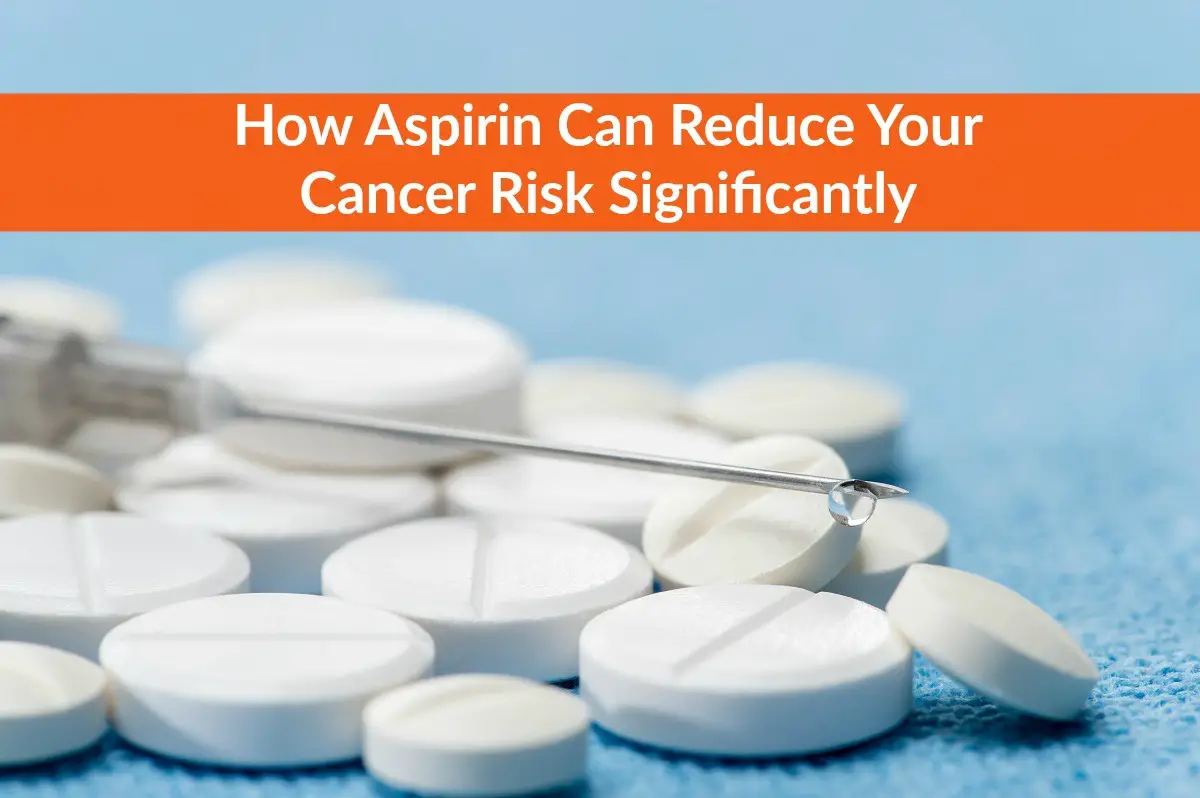A growing body of research indicates that aspirin may play a role in preventing certain types of cancer.
One of the largest studies suggests that daily aspirin intake can reduce the risk of esophageal, colorectal, stomach and prostate cancers.
The next question most people will ask is — should I take aspirin every day to stay healthy?
The answer varies depending upon health and age of the individual. It is important to note that there are some possible side effects to taking aspirin, including ulcers and gastrointestinal bleeding.
This article will take a look at aspirin’s ability to prevent cancer, then highlight some of the potential risks you may be exposed to when taking aspirin regularly.
The Body of Research
The largest recent study, headed up by Prof. Jack Cuzick, looked at the benefits and harm of aspirin consumption within the general population. The study looked at accumulated data from many health surveys and research papers.(1)
This research paper, published in Annals of Oncology journal, discovered it takes 3 years of consistent aspirin use to see health benefits, but those benefits last for several years after aspirin use is stopped.
There was a 7-9% reduction in the rate of cancer and heart attack over a 15 year period for people taking between 75 and 325 mg/day of aspirin.
That resulted in a 4% reduction in deaths over a 20 year period.
In terms of dosages, the paper found no benefit for higher doses of the drug. Positive results can be achieved with even very small doses of 75 mg/day or more.
The results of the research become more compelling when looking at specific cancers;
» the rate of colorectal cancer was reduced by 35%
» the rate of esophageal cancer by 30%
» stomach cancer by 30%
» and prostate cancer by 10%.
Professor Cuzick concluded that the benefits of taking aspirin outweighed the risks for most people.
Other scientists are beginning to understand which people gain more benefit from aspirin.
A study published in the Science Translational Medicine journal found that people with high levels of a specific enzyme in their gut lining (15-PGDH) obtain more cancer prevention benefit from aspirin.(2)
For people with high levels of the enzyme, aspirin could reduce colon cancer risk by 50%. Individuals without high levels of 15-PGDH saw no benefit from aspirin.
A person’s 15-PGDH levels can be determined from a biopsy taken during their colonoscopy.
While the findings are not conclusive, there is also evidence that aspirin may help prevent pancreatic cancer. A study found that people who took low doses of aspirin for 10 years or more could reduce pancreatic cancer risk by 50% (Streicher SA, Yu H, Lu L, Kidd MS, Risch HA, 2014).(3)
The small size of the study group makes the results less conclusive.
Another study, published in the Journal of American Geriatrics Society, found that aspirin can even help after cancer has been diagnosed. It found that within 536 older adults diagnosed with colon cancer, those who took aspirin survived longer.(4)
According to The American Cancer Society in 2017 there will be over 250.000 new cases of breast cancer and over 40.000 deaths caused by breast cancer.(5)
A 2010 observational study, published in the Journal of Clinical Oncology, showed that women who took aspirin two to five times per week were at the lowest risk of death or spread of breast cancer to other parts of the body.(6)
In addition to reducing cancer risk, there is already a large amount of research demonstrating aspirin’s ability to reduce heart attack and stroke risk (Mayo Clinic, 2014).(7)
Risks of Taking Aspirin
The biggest risk with taking aspirin is that it causes excessive bleeding.(8) The thinning effect on the blood makes it more difficult to clot and that can increase the rate of fatalities in older people with certain medical conditions.
Individuals who have the bacterium Helicobacter pylori (H. pylori) present in their stomach are also likely to develop peptic ulcers from continual use of aspirin.(9) Gastrointestinal bleeding can sometimes occur from these types of ulcers.
If a person has a poorly functioning kidney or liver, aspirin use can further impair the functioning of those organs.(10,11)
Less serious side effects include;(12)
» nausea
» gastritis
» trouble sleeping
» weakness
» dizziness
» dry mouth
» abdominal pain
If you experience symptoms like these, you should contact your doctor right away.
Conclusion
While there is some very compelling evidence that aspirin can reduce cancer risk, as always it is about weighing up the pros and cons.
Researchers suggest that for most people, aspirin consumption is safe and warranted. You need to consider your individual circumstances and how the drug may interact with other medications you are taking.
As with any new medication, check with your doctor to determine if you can safely take aspirin.
Read more:
References
(1)Cuzick J, Thorat MA, Bosetti C, Brown PH, Burn J, Cook NR, Ford LG, Jacobs EJ, Jankowski JA, La Vecchia C, Law M, Meyskens F, Rothwell PM, Senn HJ, Umar A (2014). Estimates of benefits and harms of prophylactic use of aspirin in the general population. annonc.oxfordjournals.org/content/early/2014/07/30/annonc.mdu225.full.pdf+html
(2)Fink SP, Yamauchi M, Nishihara R, Jung S, Kuchiba A, Wu K, Cho E, Giovannucci E, Fuchs CS, Ogino S, Markowitz SD, Chan AT (2014). Aspirin and the Risk of Colorectal Cancer in Relation to the Expression of 15-Hydroxyprostaglandin Dehydrogenase (HPGD). stm.sciencemag.org/content/6/233/233re2
(3)Streicher SA, Yu H, Lu L, Kidd MS, Risch HA (2014). Case-Control Study of Aspirin Use and Risk of Pancreatic Cancer. cebp.aacrjournals.org/content/early/2014/06/19/1055-9965.EPI-13-1284.abstract
(4)Reimers MS, Bastiaannet E, van Herk-Sukel M, Lemmens V, van den Broek C, van de Velde C, de Craen A, Liefers GJ (2012). Aspirin Use After Diagnosis Improves Survival in Older Adults With Colon Cancer.https://www.ncbi.nlm.nih.gov/pubmed/23176157
(5)http://www.cancer.org/cancer/breastcancer/detailedguide/breast-cancer-key-statistics
(6)DOI: 10.1200/JCO.2009.22.7918 Journal of Clinical Oncology 28, no. 9 (March 2010) 1467-1472. http://ascopubs.org/doi/full/10.1200/JCO.2009.22.7918
(7)Mayo Clinic (2014). Daily aspirin therapy: Understand the benefits and risks. mayoclinic.org/diseases-conditions/heart-disease/in-depth/daily-aspirin-therapy/art-20046797
(8)http://www.webmd.com/men/features/aspirin-day-not#1
(9)http://www.webmd.com/arthritis/news/20020104/preventing-ulcer-in-aspirin-advil-users#1
(10)https://livertox.nlm.nih.gov/Aspirin.htm
(11)https://www.kidney.org/news/kidneyCare/winter10/MedicinesForPain
(12)https://www.drugs.com/sfx/aspirin-side-effects.html
Leave Feedback: Was this article helpful?

